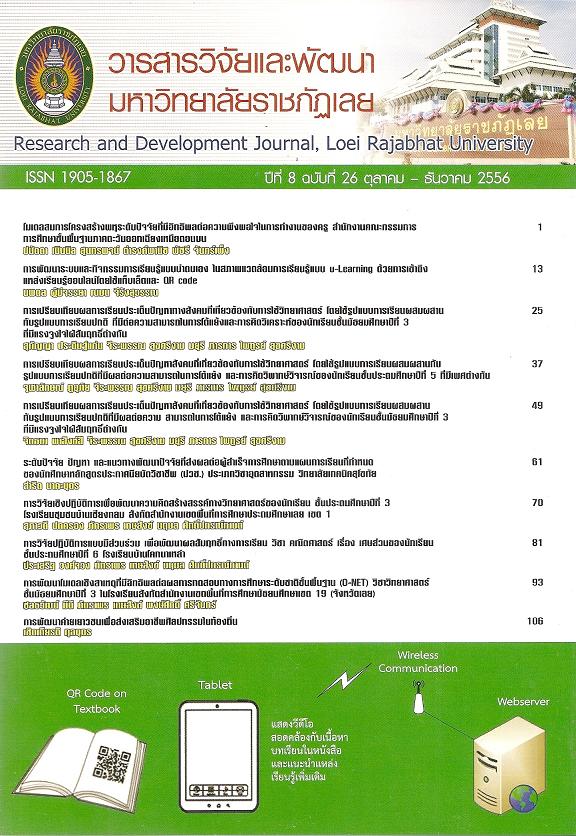การเปรียบเทียบผลการเรียนประเด็นปัญหาทางสังคมที่เกี่ยวข้องกับการใช้วิทยาศาสตร์ โดยใช้รูปแบบการเรียนผสมผสานกับรูปแบบการเรียนปกติ ที่มีต่อความสามารถในการโต้แย้ง และการคิดวิเคราะห์ของนักเรียนชั้นมัธยมศึกษาปีที่ 3 ที่มีแรงจูงใจใฝ่สัมฤทธิ์ต่างกัน
คำสำคัญ:
ประเด็นปัญหาทางสังคมที่เกี่ยวข้องกับการใช้วิทยาศาสตร์, การโต้แย้ง, การคิดวิเคราะห์, การเรียนแบบผสมผสาน, socioscientific issues, argumentation, critical thinking, the mixed method of learningบทคัดย่อ
บทคัดย่อ
การวิจัยครั้งนี้มีจุดมุ่งหมายเพื่อเปรียบเทียบการโต้แย้งและการคิดวิเคราะห์หลังเรียน ประเด็นปัญหาทางสังคมที่เกี่ยวข้องกับการใช้วิทยาศาสตร์ของนักเรียนที่มีแรงจูงใจใฝ่สัมฤทธิ์และเรียนด้วยรูปแบบการเรียนต่างกัน กลุ่มตัวอย่างเป็นนักเรียนชั้นมัธยมศึกษาปีที่ 3 จำนวน 62 คน ได้มาโดยการสุ่มแบบกลุ่ม แบ่งเป็น 2 กลุ่ม คือ กลุ่มทดลอง เรียนแบบผสมผสาน และกลุ่มควบคุม เรียนแบบปกติ การเก็บรวบรวมข้อมูลใช้แผนการจัดการเรียนรู้ จำนวน 3 แผน คือเรื่อง พืชGMOs การปลูกถ่ายอวัยวะ และ การใช้ถ่านหิน ใช้เวลาเรียนแผนละ 3 ชั่วโมง แบบทดสอบวัดการโต้แย้ง จำนวน 4 ฉบับ และแบบทดสอบวัดการคิดวิเคราะห์ จำนวน 3 ด้าน คือ ความสำคัญ ความสัมพันธ์ และหลักการ จำนวน 30 ข้อ สถิติที่ใช้ทดสอบสมมติฐานคือ Dependent t-test, F-test (Two-way MANCOVA and ANCOVA)
ผลการวิจัยพบว่า นักเรียนโดยส่วนรวม และจำแนกตามแรงจูงใจใฝ่สัมฤทธิ์หลังเรียนแบบผสมผสาน มีการพัฒนาการโต้แย้งจากการสอบครั้งที่1-4 เพิ่มขึ้นตามลำดับ และมีการคิดวิเคราะห์โดยรวมและรายด้านทุกด้านเพิ่มขึ้นจากก่อนเรียน (P<.05) นักเรียนที่มีแรงจูงใจใฝ่สัมฤทธิ์สูง มีการโต้แย้งและการคิดวิเคราะห์โดยรวมและด้านหลักการมากกว่าที่มีแรงจูงใจใฝ่สัมฤทธิ์ต่ำ (P<.025) นักเรียนเรียนแบบผสมผสาน มีการโต้แย้งและการคิดวิเคราะห์โดยรวมและด้านหลักการมากกว่าแบบปกติ (P<.025) และ มีปฏิสัมพันธ์ระหว่างแรงจูงใจใฝ่สัมฤทธิ์และรูปแบบการเรียนต่อการคิดวิเคราะห์ด้านความสำคัญและความสัมพันธ์ (P<.05)
Abstract
This research aimed to compare the argumentation and analytical thinking abilities after learning the ocioscientific issues of the students with different achievement motives and learning methods. The sample consisted of 62 Mathayomsuksa 3 (grade 9) students, obtained using the Cluster Random Sampling Technique. These students were assigned to an experimental group with 32 students who learned using the mixed method and a control group with 30 students who learned using the conventional learning method. Instruments employed for the study included (1) lesson plans on 3 socioscientific issues : genetically modified plants, organ transplantation, and alternative energy from cassava, 3 plans for the experimental group and the other 3 plans for the control group, each plan for 3 hours of learning in a week ; (2) four argumentation tests ; and (3) the analytical thinking test with 3 subscales : analysis of elements, analysis of relationships, and analysis of organizational principles, and with 30 items. The dependent t-test and the F-test (Two-way MANCOVA and ANCOVA) were employed for testing hypotheses.
The findings revealed that the students as a whole and as classified according to achievement motives who learned the socioscientific issues using the mixed method and the conventional method showed developments of argumentation abilities from the 1st test to the 4th test ; and showed gains in analytical thinking in general and in each subscale from before learning at the .05 level of significance. The students with high achievement motives indicated more argumentation abilities and analytical thinking abilities in general and in the subscale of analysis of organizational principles than the students with low achievement motives (p < .05). The experimental group students evidenced more argumentation abilities and analytical thinking abilities in general and in the scale of analysis of organizational principles than the counterpart students (p < .025). Statistical interactions of achievement motives with learning methods were found to be significant only in two subscales : analysis of elements and analysis of relationship (p < .05).
ดาวน์โหลด
รูปแบบการอ้างอิง
ฉบับ
ประเภทบทความ
สัญญาอนุญาต
ข้อความที่ปรากฎในวารสารฉบับนี้เป็นความคิดเห็นของผู้เขียนแต่ละท่าน สถาบันวิจัยและพัฒนา มหาวิทยาลัยราชภัฏเลย และกองบรรณาธิการ ไม่จำเป็นต้องเห็นด้วยและไม่มีส่วนรับผิดชอบใดๆ
สถาบันวิจัยและพัฒนา มหาวิทยาลัยราชภัฏเลย ขอให้ผู้อ่านอ้างอิงในกรณีที่ท่านคัดลอกเนื้อหาบทความในวารสารฉบับนี้






